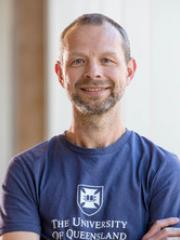Professor Mikael Boden

Primary research interest
Bioinformatics (analysis, modelling and integration of biological data)
Group website
Bioinformatics group website and wiki
About me
After finishing a PhD in 1997 at the University of Exeter, UK, I was a postdoctoral research fellow in the School of Computer Science and Electrical Engineering at The University of Queensland. I then held academic positions at the University of Skövde and Halmstad University in Sweden. I re-joined The University of Queensland in 2003. I am appointed by the School of Chemistry and Molecular Biosciences, and affiliated with the Institute for Molecular Bioscience.
Research focus and collaborations
Artificial Intelligence (AI), machine learning and data science approaches are currently re-shaping the way we research biology and biochemistry. Using biotechnology to generate data, statistics to distinguish a signal from artefacts and noise, portraying biological processes as "systems", over time and across conditions, provide the foundation of our work in bioinformatics. We use machine learning and probability to integrate massive and often complementary data sets to find drivers and determinants behind choices that nature either makes (or could make).
Our research aims to develop, investigate and apply bioinformatics methodologies to understand and resolve a range of open problems in genomics, molecular and systems biology. To this end, my group uses probabilistic modelling, machine learning and data analytics, including statistics, and we regularly publish prediction services and computational tools open to the scientific community.
Bioinformatics methods for understanding transcriptional and epigenetic regulation during mammalian development and in disease is a significant focus. We are relying on technologies such as single-cell RNA-seq and ChIP-seq, in collaboration with developmental, neuroscience and cell biologists at UQ and elsewhere. Methods for inferring evolutionary relationships between genes and proteins is another focus; in particular, in collaboration with biochemists and protein engineers, we develop tools for detecting what specific changes led to the success of a protein, and to re-run evolution to generate proteins that perform in conditions suitable for medical, industrial and agricultural applications for the future bioeconomy.
Group members
- Gabriel Foley
- Ariane Mora
- Brad Balderson
- Samuel Davis
- Sanjana Tule
- Oliver Hughes
- Zachary Riedlshah
- Ruyi Chen
- Sebastian Porras
- Thuy Linh Nguyen
Funded projects
- ARC Discovry Project (DP230101750) 2023-2025 What drives Anterior Expansion of the Central Nervous System?
- SFARI Pilot Award 2022-2024 What is the common factor driving brain overgrowth in autism?
- MRFF Genomics Health Futures Mission (2016033) 2022-2025 TRIAGE: A disease agnostic computational and modelling platform to accelerate variant classification
- NHMRC Ideas (20210390) 2022-2024 Dual-function ribonucleases: unexpected agents of antibiotic resistance
- ARC Discovery Project (DP210101802) 2021–2023 EnzOnomy - an enzyme-based production pipeline for the bioeconomy
- ARC Discovery Project (DP160100865) 2016-2018 Reconstructing protein populations of the past to explain functional specificity and engineer biological diversity
- ARC Discovery Project (DP120101772) 2012-2015 Tracing nature's template: Using statistical machine learning to evolve biocatalysts
- NHMRC Project (APP1004112) 2011-2014 A systems biology approach to elucidate common principles and mechanisms underlying triplet repeat expansion associated genetic defects
Teaching interests
I am the convener of the Bioinformatics dual major in the Bachelor of Science degree and the program director of the Master of Bioinformatics. I am coordinating Bioinformatics 2: Development and Research (BINF7000).
Achievements and awards
- Associate Editor of Frontiers in Genetics/Computational Biology
- Docent in Computer Science Halmstad University, Sweden
- Ramsay Visiting Scientist Award University of Birmingham, UK
- Awarded Gastprofessorenprogramm des Bayerisches Staatsministerium für Bildung und Kultus, Wissenschaft und Kunst, Germany
Researcher biography
Mikael Bodén has a PhD in Computer Science and statistical machine learning from the University of Exeter (UK) but has spent the last decade and a half in biological research environments, including the Institute for Molecular Bioscience/ARC Centre of Excellence in Bioinformatics and the School of Chemistry and Molecular Biosciences, where he is currently located. He is the director of UQ's postgraduate program in bioinformatics. Mikael Bodén has supervised 7 postdocs from funding he received from both ARC and NHMRC; he has been the primary advisor for 11 PhD and 3 MPhil graduates. Mikael Bodén collaborates with researchers in neuroscience, developmental biology, protein engineering and bioeconomy to mention but a few, and contributes expertise in the processing, analysis and integration of biological data; this is exemplified by recent publications in Science, Nature Catalysis, Nature Communications, Cell Systems, Nucleic Acids Research and Bioinformatics.
